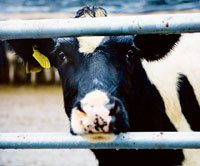DEFRA Cuts: Watchdog slams government’s animal disease costings

Poor financial records threaten to scupper DEFRA’s attempts to make farmers pay for the cost of combating animal disease.
DEFRA records are not good enough to implement a comprehensive cost-sharing regime, the government’s own financial watchdog has warned.
The department and its agencies spent £357m to tackle animal health issues during 2009-10.
But the National Audit Office said measuring the current level of expenditure failed to show whether it was money well spent.
Nor was it necessarily a good indication of likely future costs.
“To be a sound basis for decision-making, financial information needs to be robust,” says an NAO report.
An independent advisory group set up by the last government has been examining plans to share the cost of animal health and disease measures.
It is due to report its findings to ministers later this year.
Although the idea was initiated by Labour, the coalition government is keen on implementing some form of cost-sharing.
But the NAO report says any constraints or limitations relating to DEFRA data should be transparent and clearly understood.
“Key good practice principles are the consistency, completeness, reliability and relevance of the figures.”
A more sophisticated analysis depended on evidence that expenditure was value for money – and some understanding of what caused costs to vary.
“The department’s financial recording systems were not designed to measure the full costs of addressing specific disease risks in different farming sectors.”
Neither were they set up to support a charging regime, the NAO report added.
“The data do not measure, with precision, the full costs, across all agencies, of addressing specific animal health risks.”
It concludes: “This information as it stands is not of the quality that would be needed to implement a comprehensive cost sharing regime.”
